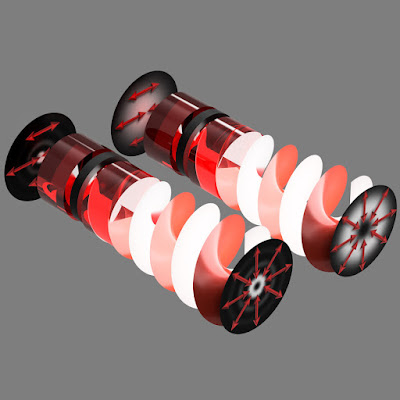 |
| This image shows the creation of hybrid entangled photons by combining polarization with a "twisted" pattern that carries orbital angular momentum. Credit: Forbes and Nape |
Topics: Electrical Engineering, Electromagnetic Radiation, Quantum Computing, Quantum Electrodynamics, Quantum Mechanics
Structured light is a fancy way to describe patterns or pictures of light, but deservedly so as it promises future communications that will be both faster and more secure.
Quantum mechanics has come a long way during the past 100 years but still has a long way to go. In AVS Quantum Science researchers from the University of Witwatersrand in South Africa review the progress being made in using structured light in quantum protocols to create a larger encoding alphabet, stronger security and better resistance to noise.
"What we really want is to do quantum mechanics with patterns of light," said author Andrew Forbes. "By this, we mean that light comes in a variety of patterns that can be made unique—like our faces."
Since patterns of light can be distinguished from each other, they can be used as a form of alphabet. "The cool thing is that there are, in principle at least, an infinite set of patterns, so an infinite alphabet is available," he said.
Traditionally, quantum protocols have been implemented with the polarization of light, which has only two values—a two-level system with a maximum information capacity per photon of just 1 bit. But by using patterns of light as the alphabet, the information capacity is much higher. Also, its security is stronger, and the robustness to noise (such as background light fluctuations) is improved.
"Patterns of light are a route to what we term high-dimensional states," Forbes said. "They're high dimensional, because many patterns are involved in the quantum process. Unfortunately, the toolkit to manage these patterns is still underdeveloped and requires a lot of work."
Structured light promises path to faster, more secure communications
American Institute of Physics, Phys.org